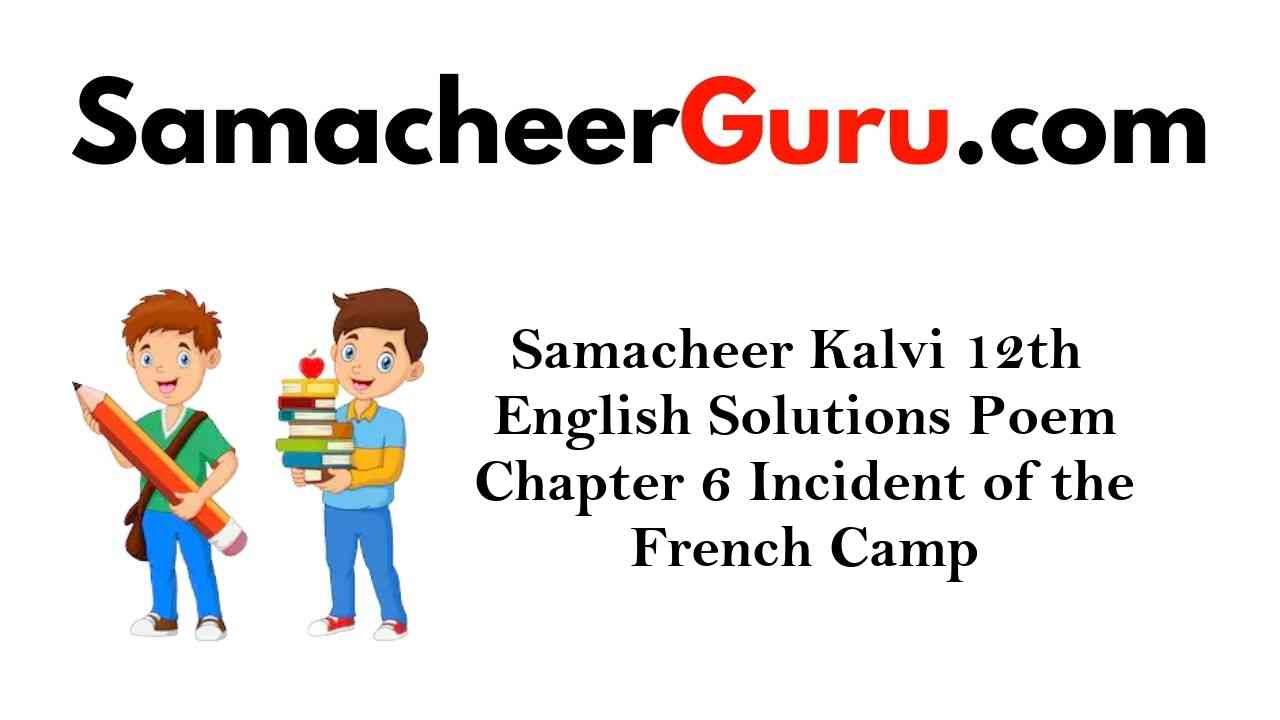Students can Download English Lesson 6 Incident of the French Camp Questions and Answers, Summary, Activity, Notes, Samacheer Kalvi 12th English Book Solutions Guide Pdf helps you to revise the complete Tamilnadu State Board New Syllabus and score more marks in your examinations.
Tamilnadu Samacheer Kalvi 12th English Solutions Poem Chapter 6 Incident of the French Camp
Warm Up
Have you played chess or watched the game carefully?
Now identify the chess pieces and complete the table below. Discuss the role of each piece in the game.
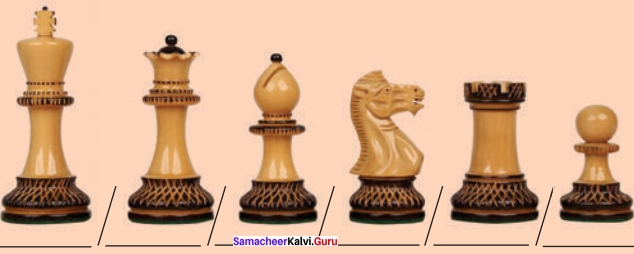
King: The King can move one space in any direction. He can never move into check. He can never be adjacent to opponent king. It is the most important piece on the chess board. If he is checkmated, the game is over. The King can also castie and take the protection of Elephant.
Queen: The queen is often the most powerful piece in chess. She can move any number of spaces in any direction as long as she is not obstructed by any other power. If that obstacle is opponent, she can remove it.
Bishop: There are two bishops for each player situated next to the Queen and the king respectively. They can move along the diagonals of the chess board. It is bound to the colour square it is originally placed. If it is set in black square, throughout the game it can move diagonally in black square. If the opponent comes into contact in the black square, it can remove it.
The Knight: Between Bishop and the Rook, there are two knights. They can leap over other pieces in L shape. On encountering opponent, it can be eliminated in its ‘L’ path.
The Rook: There are two rooks for each player. They are located in each comer of the board next to the Knight. They move up and down the rank and file of the chess board and can move any number of spaces as long as their path is not obstmcted by their own army. If opponent’s pieces cross their way, they can remove them.
The Pawn: Each player has eight pawns. They provide the first line of defence to the King. Pawn has several unique attributes. It can move one or two paces forward. After the Initial move they can move only one step ahead. To capture enemy, Pawn moves only diagonally. Once the pawn reaches the end of enemy’s territory, even the queen lost in the battle can be reclaimed.
Samacheer Kalvi 12th English Incident of the French Camp Textual Questions
1. Fill in the blanks choosing the words from the box given and complete the summary of the poem.
| determination | result | dramatic |
| pride | admiration | softened |
| wounded | mound | victory |
| conquered | soared | valiant |
The poet Robert Browning narrates an incident at the French Camp in the war of 1809 between France and Austria, in a (a) ______ version. He describes the brave action of a (b) ______ soldier, whose heroic devotion to duty and his (c) ______ in it is inspiring and worthy of(d) ______ During the attack of the French army on Ratisbon, Napoleon was anxious about the (e) ______ .Austrians were defending Ratisbon with great (f) ______ and courage. Napoleon was watching the war standing on a (g) ______ near the battlefield. All of a sudden a rider appeared from the closed smoke and dust. Riding at great speed, jumping and leaping, he approached the mound where Napoleon stood. As he came closer, the narrator noticed that the rider, a young boy, was severely wounded. But the rider showed no sign of pain and smiling in joy, jumped off the horse and gave the happy news of (h) ______ to the emperor. He exclaimed with pride that French had (i) ______ Ratisbon and he himself had hoisted the flag of France. When Napoleon heard the news, his plans (j) ______ up like fire. His eyes (k) ______ when he saw that the soldier was severely wounded. Like a caring mother eagle, the emperor asked if he was wounded. The (l) ______ soldier replied proudly that he was killed and died
Answer:
- dramatic
- wounded
- pride
- admiration
- result
- determination
- mound
- victory
- conquered
- soared
- softened
- valiant
2. Based on your understanding of the poem, answer the following questions in one or two sentences each.
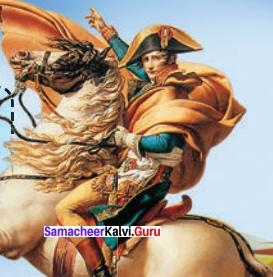
You know, we French stormed Ratisbon:
A mile or so away,
On a little mound, Napoleon
Stood on our storming-day;
With neck out-thrust, you fancy how,
Legs wide, arms locked behind,
As if to balance the prone brow
Oppressive with its mind.
![]()
Just as perhaps he mused, ‘My plans
That soar, to earth may fall,
Let once my army-leader Lannes
Waver at yonder wall’, –
Out ’twixt the battery-smokes there flew
A rider, bound on bound
Full-galloping: nor bridle drew
Until he reached the mound.
Then off there flung in smiling joy,
And held himself erect
By just his horse’s mane, a boy:
You hardly could suspect –
(So tight he kept his lips compressed,
Scarce any blood came through)
You looked twice ere you saw his breast
Was all but shot in two.
You know, we French stormed Ratisbon:
A mile or so away,
On a little mound, Napoleon
Stood on our storming-day;
With neck out-thrust, you fancy how,
Legs wide, arms locked behind,
As if to balance the prone brow
Oppressive with its mind.
Just as perhaps he mused, ‘My plans
That soar, to earth may fall,
Let once my army-leader Lannes
Waver at yonder wall’, –
Out ’twixt the battery-smokes there flew
A rider, bound on bound
Full-galloping: nor bridle drew
Until he reached the mound.
Then off there flung in smiling joy,
And held himself erect
By just his horse’s mane, a boy:
You hardly could suspect –
(So tight he kept his lips compressed,
Scarce any blood came through)
You looked twice ere you saw his breast
Was all but shot in two.
Question (a)
Who do you think is the narrator of the poem?
Answer:
A French soldier is the narrator of the poem.
Question (b)
Where was the narrator when the incident happened?
Answer:
Narrator was standing by Napoleon Bonaparte when the incident happened.
Question (c)
Who took the city of Ratisbon by storm?
Answer:
French soldiers led by Marshall Lannes took the city of Ratisbon by storm.
Question (d)
Where was Napoleon standing on the day of attack on the city of Ratisbon?
Answer:
Napoleon was standing on a mound near the battlefield (i.e.) Ratisbon city.
Question (e)
Describe the posture of Napoleon.
Answer:
Napoleon’s neck was out thrust. He kept his legs wide and arms locked behind, as if to balance his body against his brow heavy with oppressive thoughts about the battle.
Question (J)
Who came galloping on a horse to Napoleon?
Answer:
A boy-soldier came galloping on a horse to Napoleon.
Question (g)
What does the phrase ‘full galloping’ suggest?
Answer:
Full galloping suggests full speed.
Question (h)
Why was the rider in a hurry?
Answer:
The rider was carrying first hand information about the victory at Ratisbon. So, he was in a hurry.
Question (i)
What did the rider do when he reached Napoleon?
Answer:
He jumped off his horse when he reached Napoleon.
Question (j)
Why did the rider keep his lips compressed ?
Answer:
The rider was mortally wounded. He kept his lips tight to prevent blood from flowing out.
Question (k)
Where did the rider plant the French flag after Ratisbon was captured?
Answer:
The rider had planted the French flag at the Market place in Ratisbon.
Question (l)
What was Napoleon’s reaction on hearing the news of victory?
Answer:
Napoleon’s emotions started soaring up again on hearing the news of victory.
Question (m)
When did the narrator find that the boy was badly wounded?
Answer:
Soon after the boy disclosed the conquest of Ratisbon and his glorious role in perching the French flag, Napoleon found that the boy was wounded.
Question (n)
Why did Napoleon’s eyes become soft as a mother eagle’s eyes?
Answer:
Napoleon’s eyes softened like a mother eagle who has mixed feelings about the bravery of the eaglet and grief on the mortal injuries sustained by it during the fight with a tougher foe. He became sad because the boy-soldier was mortally wounded.
Question (o)
How did the young soldier face his end?
Answer:
The young soldier died with a smile frozen on his lips.
3. Literary Devices
Mark the rhyme scheme of the poem. The rhyme scheme for the first stanza is as follows. “With neck out-thrust, you fancy how, a
Legs wide, arms locked behind, – b
As if to balance the prone brow – a
Oppressive with its mind. – b
Just as perhaps he mused, ‘My plans – c
That soar, to earth may fall, – d
Let once my army-leader Lannes – c
Waver at yonder wall ’, – d
Out ’twixt the battery-smokes there flew – a
A rider, bound on bound – b
Full-galloping: nor bridle drew – a
Until he reached the mound. – b
Then off there flung in smiling joy, – c
And held himself erect – d
By just his horse’s mane, a boy: – c
You hardly could suspect – d
(So tight he kept his lips compressed, – a
Scarce any blood came through) – b
You looked twice ere you saw his breast – a
Was all but shot in two. b
‘Well’, cried he, ‘Emperor, by God’s grace – c
We’ve got you Ratisbon! – d
The Marshal’s in the market-place c
And you ’ll be there anon, – d
To see your flag-bird flap his vans – a
Where I, to heart’s desire, – b
Perched him! ’ The Chief’s eye flashed; his plans – a
Soared up again like fire. – b
The Chief’s eye flashed; but presently – c
Softened itself, as sheathes – d
A film the mother-eagle’s eye – c
When her bruised eaglet breathes: – d
‘You ’re wounded! ’ ‘Nay ’, his soldier’s pride – a
Touched to the quick, he said: – b
‘I’m killed, Sire! ’And, his Chief beside – a
Smiling, the boy fell dead. – b
Appreciate The Poem
4. Read the lines given below and answer the questions that follow.
(a) “Legs wide, arms locked behind,
As if to balance the prone brow Oppressive with its mind.”
Question (i)
Whose action is described here?
Answer:
Napoleon Bonaparte’s action is described here.
Question (ii)
What is meant by prone brow?
“Prone brow” means brow accustomed or inclined down to contemplate on serious matters.
Question (iii)
What is his state of mind?
Answer:
His mind is oppressed with anxious thoughts regarding the outcome of the war at Ratisbon.
(b) “You ’re wounded! ’ ‘Nay ’, his soldier’s pride
Touched to the quick, he said: ”
Question (i)
Why did the boy contradict Napoleon’s words?
Answer:
The boy contradicted Napoleon’s words because the word “wounded” hurt his sense of pride and patriotism and his voluntary sacrifice of life for his country.
Question (ii)
Why was his pride touched?
Answer:
The boy was naturally proud to have perched the French flag and got shot by the enemy. He had hurried holding on to his life to disclose the news of conquest of Ratisbon to the French king. When he said, “you’re wounded”, he interpreted it as an insult to his bravery and patriotism. So, his pride was touched.
(c) “A film the mother-eagle’s eye
When her bruised eaglet breathes”
Question (i)
Who is compared to the mother eagle in the above lines?
Answer:
Napoleon Bonaparte is compared to mother eagle.
Question (ii)
Explain the comparison.
Answer:
A mother eagle will be proud when the eaglet takes on a stronger predator. When the eaglet is hurt, the mother eagle will be naturally sad as no mother will want the young one to perish in a combat. The king, like a mother, is sad about the impending death of a valiant boy-soldier.
Additional Questions
(а) “Just as perhaps he mused, ‘My plans
That soar, to earth may fall,”
Question (i)
Who does ‘he’ refer to?
Answer:
‘He’ refers to Napoleon Bonaparte.
Question (ii)
What may hamper the soaring plans of Napoleon?
Answer:
The negative outcome of battle at Ratisbon may hamper his soaring plans.
Question (iii)
What is the figure of speech employed in these lines?
Answer:
‘plans that soar’ – Metaphor.
(b) “Full-galloping: nor bridle drew
Until he reached the mound. ”
Question (i)
Why was the rider in a hurry?
Answer:
The rider was carrying an urgent message to Napoleon Bonaparte.
Question (ii)
Where did the soldier stop? Why?
The soldier stopped at the mound. Napoleon Bonaparte was expecting news about the outcome of the battle at Ratisbon.
(c) “The Chief’s eye flashed; his plans
Soared up again like fire.”
Question (i)
Who is described as the chief?
Answer:
Napoleon Bonaparte is described as the chief.
Question (ii)
Identify the figure of speech employed.
Answer:
Simile
(d) Explain the following lines with reference to the context.
Question (i)
“Then off there flung in smiling joy,
And held himself erect”
Answer:
Reference: These words are from the poem ‘Incident of the French Camp” written by Robert Browning.
Context and Explanation: The narrator says these words while describing the arrival of a boy soldier at the mound where Napoleon was anxiously awaiting news about the battle at Ratisbon. Amidst the smoke of cannon fire, a horse sped fast carrying a boy-soldier. He jumped off the horse with a beaming face. It seemed that he had a brought a good news.
Question (ii)
‘I’m killed, Sire! ’And, his Chief beside,
Smiling, the boy fell dead.”
Answer:
Reference: These lines are from the poem ‘Incident of the French Camp” written by Robert Browning.
Context and Explanation: The poet says these words while explaining the hurt reaction of the boy-soldier. The boy-soldier who brought the news of conquest of Ratisbon was all but ‘ split into two. When emperor Napoleon expressed his grief on his wounded status, the boy soldier said, “Nay I’m killed sire.”
Question (iii)
“To see your flag-birdflap his vans Where I, to heart’s desire,
Perched him!
Answer:
Reference: These lines are from the poem ‘Incident of the French Camp” written by Robert Browning.
Context and Explanation: The narrator says these through the boy-soldier while explaining his role in the final stages of storming of Ratisbon. He said proudly that he himself hoisted French Flag to his heart’s content at the Market place in Ratisbon.
Additional Question
Question (i)
“As if to balance the prone brow
Oppressive with its mind.”
Answer:
Reference: These words are from the poem ‘Incident of the French Camp” written by Robert Browning.
Context and Explanation: The narrator says these words about the ambitious emperor of France who was anxiously waiting for the news about the outcome of battle at Ratisbon. His inclined brow appeared as if it was trying to balance the heart laden with worry.
Question (ii)
“Let once my army-leader Lannes
Waver at yonder wall’
Answer:
Reference: These lines are from the poem ‘Incident of the French Camp” written by Robert Browning.
Context and Explanation: The poet says these words while Napoleon awaited anxiously the news about the outcome of storming of Ratisbon. As his ambition rested on the outcome, he was restless. He wanted Marshall Lannes to send signal from Ratisbon to allay his fears.
Question (iii)
“Afilm the mother-eagle’s eye When her bruised eaglet breathes:
Answer:
Reference: These lines are from the poem ‘Incident of the French Camp” written by Robert Browning.
Context and Explanation: The narrator witnesses the reaction of Napoleon to the fact that the boy-soldier who had brought news of success was mortally wounded. Like a mother eagle who is proud and sad about the eaglet who has fought a fierce predator and dying, is moved to tears.
Question (iv)
“‘You’re wounded! ’ ‘Nay’, his soldier’spride Touched to the quick,”
Answer:
Reference: These lines are from the poem ‘Incident of the French Camp” written by Robert Browning.
Context and Explanation: The poet says these words describing the interaction between the ‘ mortally wounded soldier and Napoleon Bonaparte. The boy-soldier’s chest was split into two. He had tightly closed his lips to stem the blood about to flow. The emperor said that he was wounded. As his pride was hurt, he disagreed with him.
Question (v)
“Afilm the mother-eagle’s eye When her bruised eaglet breathes:
Answer:
Reference: These lines are from the poem ‘Incident of the French Camp” written by Robert ‘ Browning.
Context and Explanation: The narrator said these words as to what befell the valiant boy- soldier who brought the news to ease the heart of Napoleon. He didn’t accept the sympathy of Napoleon. Being valiant he was at the verge of embracing death.
5. Answer the following questions in about 100-150 words each.
Question (a)
The young soldier matched his emperor in courage and patriotism. Elucidate your answer.
Answer:
Emperor Napoleon was an astute planner planning the moves of the battle observing each step the French army made. Emperor Napoleon being a bold and wise warrior always had two plans, one to advance forward if the battle brings victory and the next as to what to be done in case the battle is lost. He was not resting at a tent during the battle. He was very close to the place of battle planning the strategic steps.
Similarly, the boy-soldier was also equally brave. Unlike the emperor, the boy soldier flung himself in the midst of battle and risked his life. He did not bother about his death. He doggedly carried out the mission of hoisting French national flag. Instead of being carried away for first aid, he hurried on horse back to communicate the news of conquest of Ratisbon despite his chest being split into two. So, it is obvious the boy- soldier’s patriotism and gallantry are equal to that of Napoleon.
Question (b)
What is the role of the young soldier in the victory of the French at Ratisbon?
Answer:
The young soldier was one of the soldiers in the infantry division leading the battle. On storming Ratisbon, unmindful of the cannon fire, he climbed the flag post with French flag and hoisted it. He received the bullets in turn for his service to the emperor and French army. He did not succumb to the bullets immediately, he galloped on horse back to convey the news to emperor Napoleon Bonaparte himself. He held on to life till he reached Napoleon and conveyed the happy news. He waited with abated breath to know the reaction of his great leader. When he expressed his sadness, his pride was hurt. He denied the emperor’s sympathy and said emphatically that he was killed. He fell down beside emperor Napoleon with a smiling face and died.
Question (c)
Napoleon was a great source of inspiration to his army. Justify.
Answer:
Napoleon was a powerful orator and was able to muster the support of young soldiers who could gladly throw away their lives for the glory of France and for fulfilling the ambitious plans of territorial expansion of Napoleon Bonaparte. He inspired unprecedented courage among the soldiers. They never worried about the strength of the enemy army or their pile of armaments. They faced the battles with the single minded determination to ‘do or die’ or do and die. They kissed death for the glorification of France and for making Napoleon proud of their heroism, sacrifices and patriotism.
Listening Activity
Some words have been left out in the poem below. First, read the poem. Then, fill in the missing words on listening to the reading or the recording of it in full. You may listen again, if required.
The Drum
I hate that drum’s discordant sound, Parading round, and round, and round: To thoughtless youth it pleasure yields, And lures from cities and from fields, sell their liberty for charms Of tawdry lace, and glittering arms; And when Ambition’s voice commands, To march, and fight, and fall, in foreign lands. I hate that drum’s discordant sound, Parading round, and round, and round; To me it talks of ravag’d plains, And burning towns, and ruin’d swains, And all that Misery’s hand bestows, To fill the catalogue of human woes.
I hate that drum’s (1) ______ sound,
Parading round, and round, and round:
To thoughtless (2) ______ it pleasure yields,
And lures from cities and from fields, sell their (3) ______ for charms
Of tawdry lace, and glittering arms;
And when (4) ______ voice commands,
To march, and fight, and fall, in (5) ______
I hate that drum’s discordant sound, Parading round, and round, and round; To me it talks of
(6) ______ plains, And burning towns, and ruin’d swains, And all that Misery’s hand bestows, To
fill the (7) ______ of human woes.
Answer:
- discordant
- youth
- liberty
- ambition’s
- foreign lands
- ravag’d
- catalogue
Incident of the French Camp About The Poet
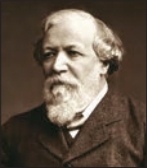
Robert Browning (7 May 1812-12 December 1889) was one of the famous Victorian poets known for his marvellous dramatic monologues like “Last Ride Together”. His poems are known for their irony, characterisation, dark humour, social commentary, historical settings and challenging vocabulary and syntax. He developed a unique form of conversational, unrhythmic verse. The collection ‘Dramatis Personae’ and the book-length epic poem “The Ring and the Book” made him a leading British poet. By 1881 in recognition of his outstanding contribution to literature, a literary society called Browning Society was established.
Incident of the French Camp Summary in English
Introduction
The poem “Incident of the French camp describes an act of chivalry, gallantry, patriotism and sacrifice on the part of a young French soldier. The poem narrates an actual event in the war between France and Austria led by Napoleon in 1809.
Napoleon was standing on a little mound, eagerly looking towards Ratisbon. His mind was oppressed with anxious thoughts. He was apprehensive that all his ambitious plans would come to nothing if Lannes failed to storm Ratisbon. His neck was out thrust. Napoleon was deep in thought. He awaited a signal from his army chief Lannes. At that moment, a rider came almost flying on horseback. The horse was on full gallop understanding the significance of the rider’s mission. The rider did not draw the bridle (i.e.) check the speed of the horse until he reached the mound where Napoleon Bonaparte was standing.
A slip of a youth, a boy soldier jumped off the horse with a beaming face. The boy was not even tall enough to touch the mane of the horse. He kept his lips tight lest blood could pour forth. He stood erect. His chest was blown into half in the battle.
The boy-soldier conveyed the news that they had got him Ratisbon. Marshal Lannes was in the market place waiting for him. He should hurry up. The boy- soldier added that to his heart’s desire perched French bird-flag himself.
The chief’s eyes flashed with fresh ambition. But suddenly it softened seeing the mortal wound of the soldier. Like a mother eagle who is pained by the prowess of the eaglet who challenged a stronger foe but got hurt in the fight. The emperor’s eyes got misty with tears. He caringly said, “you are wounded.” The soldier’s pride was hurt. He replied in an ego-hurt voice, “Nay, I’m killed sire.” With a smile, characteristic of valiant heroes, the boy-soldier fell down dead.
Conclusion
Wars are fought and won. But those who sacrifice their lives are ordinary mortals who never get an iota of share in the glory of success.
Incident of the French Camp Summary in Tamil
முன்னுரை:
இக்கவிதை ஓர் இளம் பிரென்சுப் படைவீரனின் வீரதீர சாகசத்தையும், உயிர்த் தியாகத்தையும் சித்தரிப்பதாக அமைந்துள்ளது. ஆஸ்திரியா நாட்டுக்கும், பிரான்சுக்கும் இடையே 1809ஆம் ஆண்டு போர் நடைபெற்ற போது நிகழ்ந்த ஓர் உண்மை நிகழ்ச்சியை இக் கவிதை சொல்கிறது.
நெப்போலியன் ஒரு குன்றின் மீது நின்று கொண்டு ரேடிஸ்பனை நோக்கிப் பார்த்துக் கொண்டிருந்தார். அவர் மனம் பயம் கலந்த பல சிந்தனைகளால் அலைக்கழிக்கப்பட்டுக் கொண்டிருந்தது. ராட்டிஸ்பன் நகரத்தைச் சூறையாடும் முயற்சியில் அவரது தளபதி லான்ஸ் வெற்றி பெறவில்லை என்றால் அவரது கனவுத் திட்டங்கள் அனைத்து தவிடு பொடியாகிவிடும். கழுத்தை நீட்டி ஆவலோடு நெப்போலியன் பார்த்துக்கொண்டிருந்தான். ஆழ்ந்த சிந்தனையில் அவர் மூழ்கியிருந்தார். அப்போது ஓர் இளம் சிப்பாய் குதிரை மீது அமர்ந்து கடிவாளத்தைக் கூடப் பிடிக்காமல் காற்றாய் பறந்து வந்தான். குதிரை தனது முதலாளியின் பயண நோக்கத்தை உணர்ந்ததாலோ என்னவோ, முழு வேகத்தில் ஓடியது. நெப்போலியன் இருக்குமிடம் வரும் வரை குதிரையின் வேகம் குறையவேயில்லை.
மீசை முளைக்காத சிறு பாலகன் குதிரையில் இருந்து கீழே குதித்தான். குதிரை பிடறி முடியளவு கூட அவன் உயரமாக வளர்ந்திருக்கவில்லை . அவன் முகம் பிரகாசித்தது, தனது உதடுகளை இறுக்க மூடியிருந்தான். அவற்றைத் திறந்தால் இரத்தம் கொட்டியிருக்கும். நிமிர்ந்து கம்பீரமாக அவன் நின்றான். அவனது நெஞ்சை குண்டுகள் இரண்டாகப் பிளந்திருந்தன. “மன்னா, தங்களுக்காக ராட்டிஸ்பன் நகரைக் கைப்பற்றிவிட்டோம். மார்ஷல் லேன்ஸ் உங்களுக்காக சந்தைத் திடலில் காத்துக் கொண்டிருக்கிறார். நானே என் உள்ளம் குளிர நமது நாட்டுக் கொடியை கம்பத்தில் ஏற்றினேன்” என்றான். இப்போது மன்னன் நெப்போலியனின் கண்கள் பனித்தன. தாய்க் கழுகு, தனது குஞ்சு வலுவான எதிரியோடு போராடி எவ்வாறு பெருமைப் பட்டாலும் கண் கலங்குமோ அதைப் போன்ற மனநிலையில் நெப்போலியன் சொன்னார். “நீ காயமடைந்து விட்டாய்”. இதைக் கேட்ட சிப்பாய் பாலகன் அவமானத்தால் குறுகிப் போய்ச் சொன்னான், “இல்லை மன்னா! நான் கொல்லப்பட்டேன்”. அடுத்த நொடி புன்னகைத் தவளும் முகத்தோடு அவன் நெப்போலியன் அருகிலேயே விழுந்து மடிந்தான்.
முடிவுரை:
போர்கள் நடக்கின்றன. வெற்றியும், தோல்வியும் சகஜம். ஆனால், போர்க்களத்தில் மரணமடையும் சாதாரண சிப்பாய்களின் புகழ் வெளிச்சத்துக்கு வருவதே இல்லை
Incident of the French Camp Glossary
Textual:
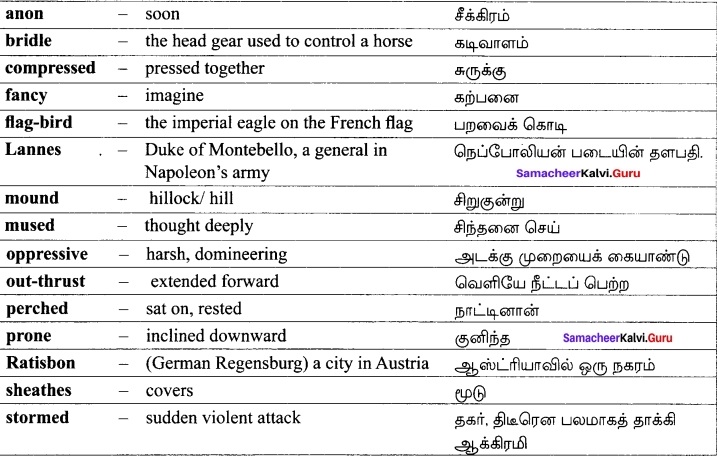
Additional:

